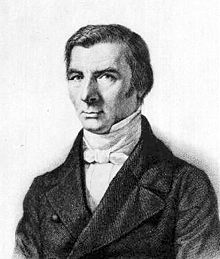Negative railroad
| Frédéric Bastiat | |
|---|---|
 |
|
| Born |
Claude-Frédéric Bastiat 29 June 1801 Bayonne, France |
| Died | 24 December 1850 (aged 49) Rome, Papal States |
| Nationality | French |
| School or tradition |
Classical liberalism |
| Influences | Richard Cobden, Adam Smith, Jean-Baptiste Say, Charles Comte, Charles Dunoyer |
| Contributions | The Law (La Loi) |
Claude-Frédéric Bastiat (French: [klod fʁedeʁik bastja]; 29 June 1801 – 24 December 1850) was a French economist and author who was a prominent member of the French Liberal School. He developed the economic concept of opportunity cost, and introduced the Parable of the Broken Window. He was also a Freemason, and member of the French National Assembly.
As an advocate of classical economics and the economics of Adam Smith, his views favored a free market and influenced the Austrian School.
Bastiat was born in Bayonne, Aquitaine, a port town in the south of France on the Bay of Biscay, on 29 June 1801. His father, Pierre Bastiat, was a prominent businessman in the town. His mother died in 1808 when Frédéric was seven years old. His father moved inland to the town of Mugron with Frédéric following soon afterward. The Bastiat estate in Mugron had been acquired during the French Revolution and had previously belonged to the Marquis of Poyanne. Pierre Bastiat died in 1810, leaving Frédéric an orphan. He was fostered by his paternal grandfather and his maiden aunt, Justine Bastiat.
He attended a school in Bayonne, but his aunt thought poorly of it and so enrolled him in the school Saint-Sever. At age 17, he left school at Sorèze to work for his uncle in his family's export business. It was the same firm where his father had been a partner.
Bastiat began to develop an intellectual interest. He no longer wished to work with his uncle and desired to go to Paris for formal studies. This hope never came true as his grandfather was in poor health and wished to go to the Mugron estate. Bastiat accompanied him and cared for him. The next year, when Bastiat was 24, his grandfather died, leaving the young man the family estate, thereby providing him with the means to further his theoretical inquiries. Bastiat developed intellectual interests in several areas including philosophy, history, politics, religion, travel, poetry, political economy and biography. "After the middle-class Revolution of 1830, Bastiat became politically active and was elected justice of the peace of Mugron in 1831 and to the Council General (county-level assembly) of Landes in 1832. He was elected to the national legislative assembly soon after the French Revolution of 1848."
...
Wikipedia
